Can You Compost Weeds? (The Truth)
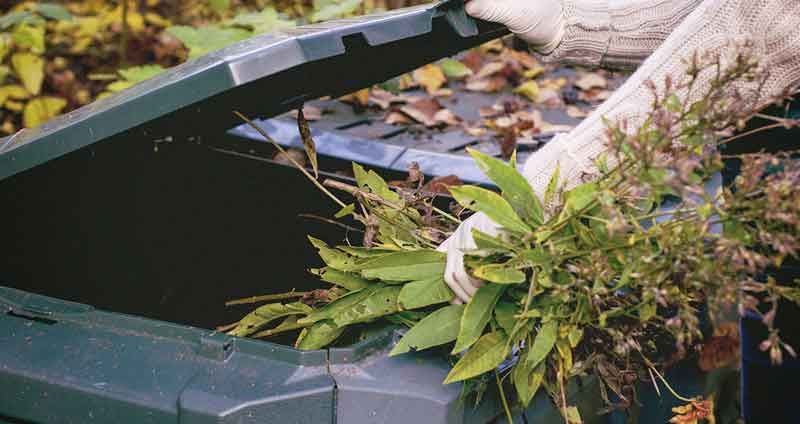
You have a good idea of what should and shouldn’t go into your compost.
But, it’s tricky knowing whether some types of waste belong there.
Like weeds!
Many gardening experts warn against composting weeds. But others say it’s safe to toss your morning glory, crabgrass, ivy roots, and blackberry bushes in with the rest of your compost.
Weeds are organic matter, so they’ll decompose with the rest of your garden and kitchen wastes. But there’s a catch: you need to take extra care when composting weeds to avoid spreading them all over your garden.
Here are the must-know recommendations for making weeds good for your garden!
Can Weeds Be Composted?
There are several effective methods for composting weeds and their seeds. Hot composting can eliminate weeds effectively. However, this is difficult to achieve with small home composting systems because sustained high temperatures are uncommon.
Nevertheless, there a still several things you can do:
- You can hot compost the weeds if you have a sizeable well-monitored system.
- Kill the weeds and their seeds by sun-drying.
- Soak them in water before adding them to your compost.
- Compost the weeds separately in black plastic bags.
Keep reading for all the answers to your questions about how to compost invasive plants.
Tip: try to uproot weeds before they have time to go to seed.
Can I Put Dried Weeds In Compost?
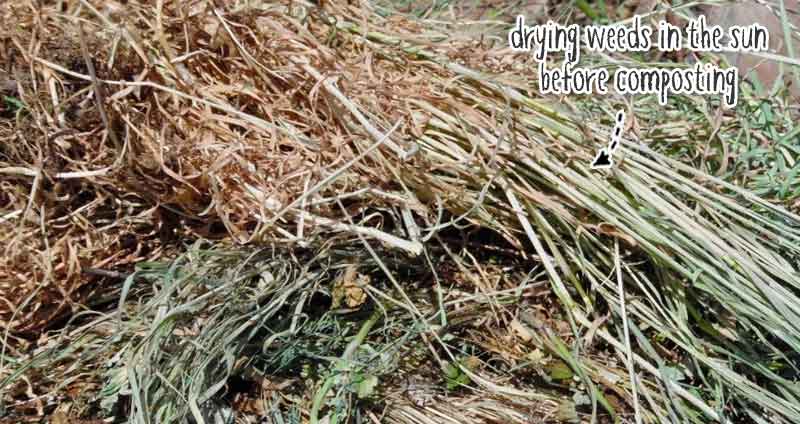
You can add thoroughly dried weeds to your compost.
During the sunny seasons, spread your weeds out on a metal surface (not on your grass or soil!) and let the sun dry them out. After about 2 to 3 weeks, the weeds will be crisp and safe to add to your compost.
Some gardeners use a platform made out of chicken wire as a drier before adding them to compost.
Can You Compost Weeds Killed With Herbicide?
Composting weeds killed by herbicide is problematic. Not all herbicides destroy the seeds. And the chemicals in herbicides can be harmful to the composting microbes.
Herbicides work in different ways to control weeds. For example, some herbicides might kill weed plants but leave their seeds viable to wreak havoc in your compost. And the herbicides that are powerful enough to kill weeds (seeds and all) might make your compost toxic to plants.
Keep herbicide-killed weeds out of your compost to protect your garden against possible rouge weed seeds and poisons.
If you really want to compost chemically treated weeds, compost them on their own and use them on plants less susceptible to herbicides. Don’t use the resulting compost on food crops.
Can Weeds Go In A Compost Pile?
You can add weeds to your pile if you’ve got a hot composting system. Just know that you’ll need to tend to your pile to keep the temperatures high enough to kill the weeds and their seeds.
If you’re letting your compost do its own thing (cold composting), don’t add weeds unless you’ve dried them in the sun first.
Another option is to drown your weeds before adding them to your compost pile.
Put the weeds into a container with a tightly fitting lid, pour water over them till they’re submerged, close the top, and leave them to soak for several weeks. The water will be greenish-brown but full of nutrients and safe for your plants. Next, strain out the remaining bits of the weed plants and add them to your compost.
The resulting liquid can be used as a plant fertilizer or a booster for your compost heap.
Can You Put Weeds In A Compost Tumbler?
You can throw a few weeds into your compost tumbler as long as you maintain high temperatures. You might find it easier to keep temperatures up in a compost tumbler than in a pile because tumblers are better at generating and retaining heat.
You can sun-dry or soak the weeds before adding them to your tumbler to be on the safe side.
Why Should You Not Compost Weeds?
Unless you use the proper technique when composting weeds, their roots and seeds can survive the composting process. You might then introduce the weeds to your garden as you spread compost around.
So, instead of giving your garden a treat to help it thrive, you could expose it to persistent weeds eager to take over and cause trouble.
However, if you’re careful, you can turn weeds into plant-friendly compost.
How To Compost Weeds
There are ways to stop sneaky weed seeds and roots from making it through the composting process alive.
I’ve let you in on two ways to nuke weeds before adding them to your compost (that is, by drying them in the sun or soaking them). I’ll now share other ways to safely compost weeds.
Does Compost Kill Weeds
Compost that gets hot enough at its core will kill weeds. But weeds need to be mixed into the center of a hot composting system to be effective.
Even the toughest weeds (think: morning glory, buttercups, Bermuda grass, oxalis, quackgrass, and crabgrass) or weeds that have seeded stand no chance of surviving scorching compost.
The problem is: that it’s challenging getting backyard compost heaps to produce enough heat to destroy the weeds.
How Do You Kill Weeds In Compost
The best way to kill weeds in compost is by heating things up!
The hardier the weed, the higher the temperatures needed to kill it. Temperatures around 115°F (46°C) can destroy meeker weeds. Still, more robust species might only be knocked out by temperatures as high as 145 to 160°F (62 – 71°C).
Wondering how hot your compost is? You could always stick your gloved hand into the pile’s center and feel around. However, you’d get a more accurate measurement using a compost thermometer – check out this model on Amazon. Monitor the temperature all over the compost, as some areas can be cooler than others.
How To Hot Compost Weeds
There’s a method to create compost that stands a chance of getting hot enough to exterminate weeds.
Start with these composting basics:
- Build a pile that’s at least 3x3x3 feet in size.
- Keep a good balance of nitrogen-rich greens (like kitchen scraps) and carbon-rich browns (for example, dry leaves and grass).
- Make sure the compost stays about as damp as a wrung-out sponge.
- Turn the compost regularly.
- Don’t add new organic wastes to the pile.
To speed up the heating process, try these tips:
- Position your compost in direct sunlight.
- Add a compost accelerator to the mix. (Amazon)
If you see steam coming from the compost when you turn it, you’re doing it right!
How Do You Compost A Large Amount Of Weeds?
One of the best ways to compost lots of weeds is in black plastic bags. You compost the weeds alone with this method, preventing them from infiltrating your compost and garden.
Composting Weeds In Black Plastic Bags
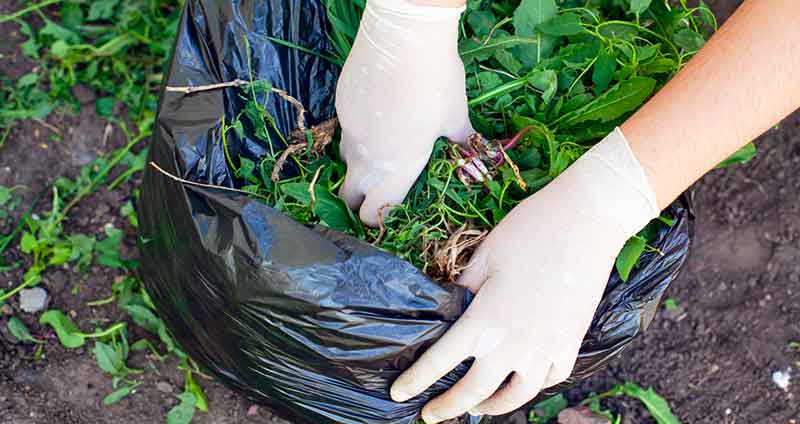
Composting weeds in black plastic bags is a simple process. Here are the steps:
- Place the weeds in heavy-duty black plastic bags.
- Add a handful of soil and a bit of water to each bag.
- Tie the bags tightly and put them somewhere out of the way for at least a year.
- Open the bags, and ta-da! The weeds will have decomposed into nourishing compost for your garden.
How Long Does It Take To Compost Weeds?
How long it takes for weeds to transform into compost depends on how they’re composted.
Although sun-drying weeds for 2 to 3 weeks or soaking them for 2 to 3 months kills the weeds and their seeds, it won’t break them down completely. Compost that’s 115 to 140°F can kill 90% of some weed seeds within hours to days, but these weeds won’t be fully composted.
The weeds won’t be viable after being dried out, soaked, or scorched, but they’ll still take time to decompose. How much time they’ll take depends on whether they’re being hot or cold composted. The type of organic matter that makes up the compost and whether they’re being composted in a bin, heap, or tumbler also impacts the decomposition rate.
Chopping up or shredding the weeds will make them break down faster.
Weeds that have been composted alone in black plastic bags take up to 2 years to fully compost.
Final Note:
Some weeds are considered highly invasive. Government organizations try to control them because they can harm livestock or crops. You’ll find a list of undesirable weeds determined by the US noxious weeds act here. And for the UK, you’ll find a list of invasive plant species here…
Read this article for a complete list of things you can compost.


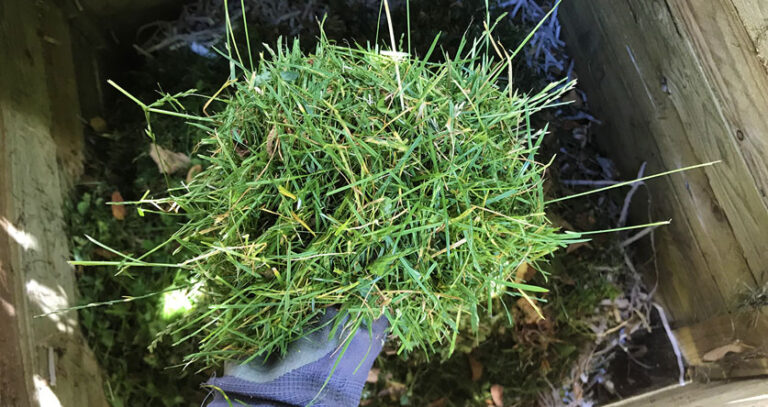
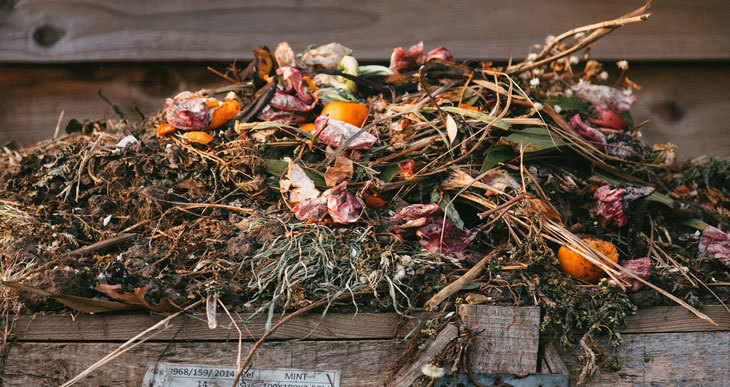

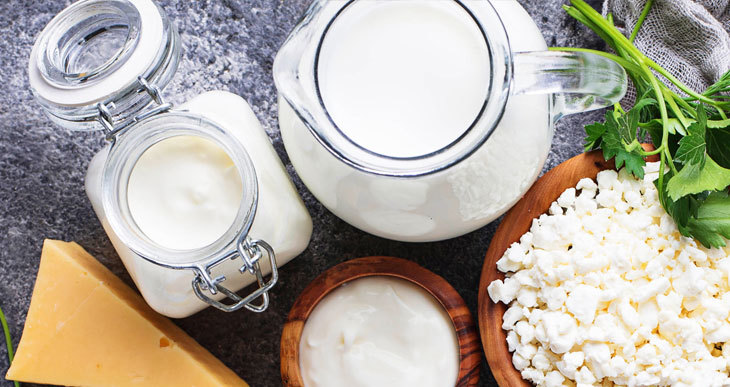
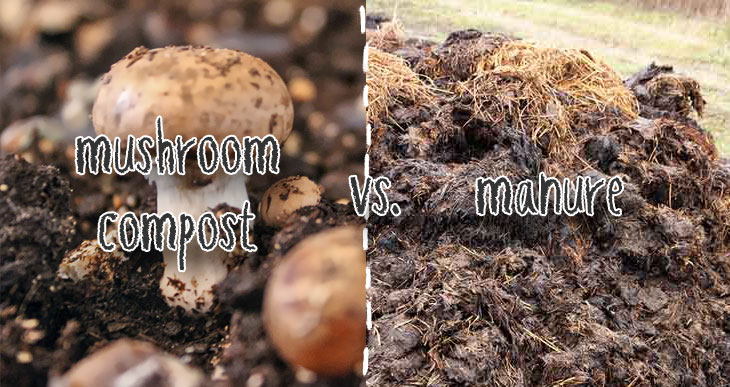
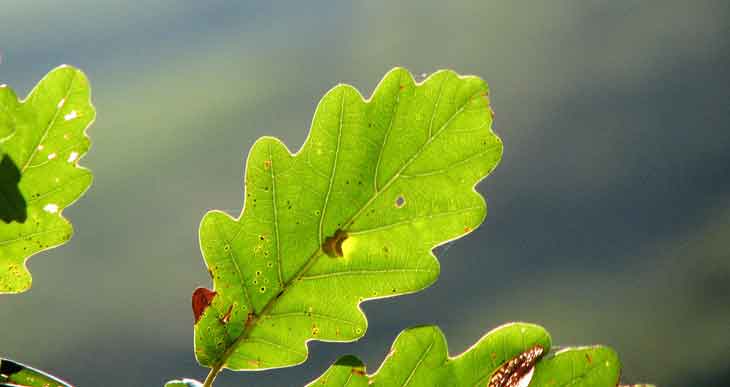
Hi there,
I have just weeded my lawn and have a small pile of weeds. Manually weeded, so no chemicals.
1. If I pour boiling water over the weeds, will I then be able to compost it? I don’t think my compost pile gets hot enough to kill the weeds.
2. Will the weeds even be of any value in the compost after pouring boiling water on it?
Hi Sumaya
So, if you decide to douse your weeds with boiling water, it’s a step in the right direction for composting, but keep in mind that it might not completely get rid of those stubborn weed roots and rhizomes!
Now, about the value of these weed warriors in your compost after the hot water treatment – they’ll still bring some organic goodness to the mix, but their nutrient content might take a slight hit.